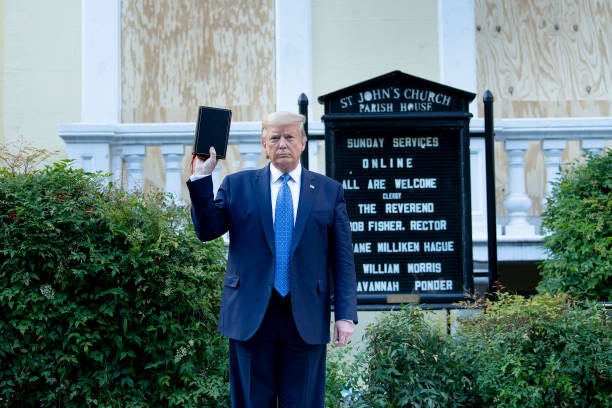
Predicting individual behavior is incredibly difficult. Groups, on the other hand, are easier to predict.
Religion is one of those identifying group factors pollsters often use to predict political outcomes. A few researchers from Notre Dame are using religious statistics as a way to explain how we've deepened political divides.
The aptly named Geoffrey Layman has a book out titled The Great Divide. It outlines the story of how the right’s most stalwart voting bloc came to be dominated by a particular set of Christian voters. Likewise, Layman explains how the left’s main voting bloc became the “nones.”
“Not the nun that wears habits,” Layman explains, “but people who, when they're asked what their religion is, say, none. No affiliation. That's been growing rapidly. If that was a religious tradition itself, it would now be the largest one in the United States. It's bigger than Catholics, bigger than evangelicals, four times larger than Southern Baptists. We've been trying to get at the consequences of this rise of the nones, and its causes.”
Essentially, Layman breaks down these two main groups into what he calls secularists and religionists.
“The religionists are what we think of when we think of the Republican Party. We think of the religious right, the people who are hardcore Republicans, hardcore Trump supporters, or Bush or Reagan supporters in the past," says Layman.
"They not only vote republican and identify themselves as republicans," he continues. "They're more likely to participate beyond, doing work for a party or candidate."
However, Layman goes on to show how the nones on the left have become the foil to the deeply religious right-wing voters.
"On the other side, the secularists have really become the core of the democratic party. They're also the people who are most likely to support the most liberal democrats, people like Bernie Sanders, AOC, or Elizabeth Warren."
However, although there’s this clear delineation between the religious right and the secular left, Layman says that historically, the religious right has been and is much more organized than the secularists.
Trump's influence on the religious right
Trump notched very high support from the religious right in all three elections, pulling about 80% of this demographic despite being a figure with a morally checkered past.
So this prompts the question: Does the behavior of the candidate necessarily matter to the religionists or the secularists, or is it easily ignored?
For example, Biden was a Democrat but an ardent catholic. President Trump has had a checkered history, but did extremely well among religionists.
Layman explained, “It's a really interesting change in American politics that's happened with the emergence of Donald Trump...Hardcore religionists used to tell pollsters character and personal behavior matters."
A good example of this was the widespread protest during the Clinton sex scandal with Monica Lewinsky. But Layman continues, "Then Donald Trump comes along and now the evangelicals are actually the least likely to say moral character matters, viewing it rather as a transactional relationship.
"Many evangelicals," Layman explains, "will say well we supported people like Ronald Reagan and George W. Bush...Mitt Romney might be a good Christian man, but he doesn't deliver like Trump.... We know he's done some things in life and speaks crassly, but he delivers. He got Supreme Court Justices to overturn Roe v Wade."
How religious groups intensify political polarization
The same can be said of secularists, who despite a lack of religious beliefs have massed large support for strong religious candidates, like Biden.
“The secularists are Biden supporters despite his strong faith...but they do tend to, if they have a choice within the democratic party, support people like Bernie Sanders, who's not really a religious person... but mainly what they're looking for is a true progressive liberal democrats," says Layman.
Layman suggests that although “nones” are the fastest growing religious group, the number of zealous Christians really isn’t getting smaller. The types of Christians that are dwindling are what you might call the lukewarm Christians.
Lay says, "The People who are reading Scripture and praying, they're not really declining. What's declining is sort of that middle, the people who are sort of occasionally attending (church), who are religious, but in a non-zealous way."
In the end, Layman suggests, the more religious factions blend political and religious loyalty, the more every issue seems to become deeply polarized.
Layman says, “You get these two camps of secularists and religionists, and unfortunately, that fits really well with our polarized politics. And you ask about tariffs and economic policy that really wouldn't seem to have anything to do with this. But as these groups are becoming ingrained in the parties, they tend to fight as zealously about these economic issues, like tariffs or health care, as they do about abortion and gay marriage.”
